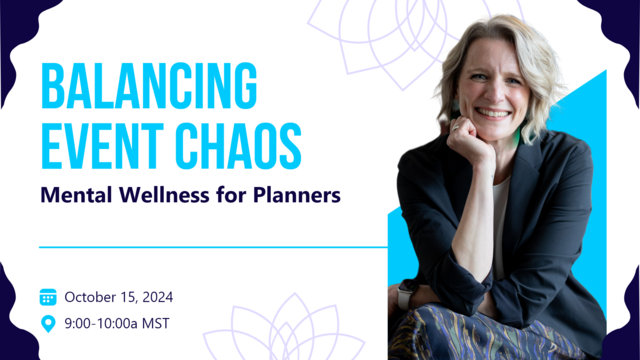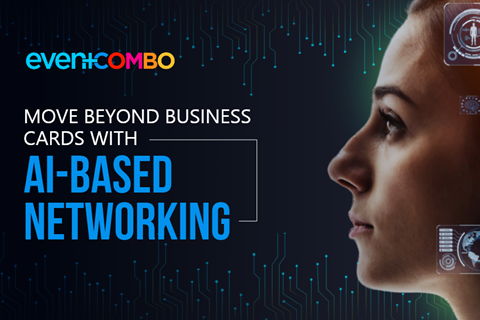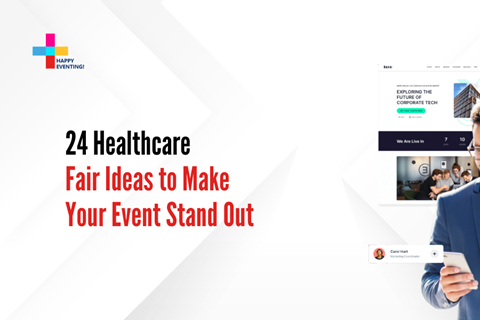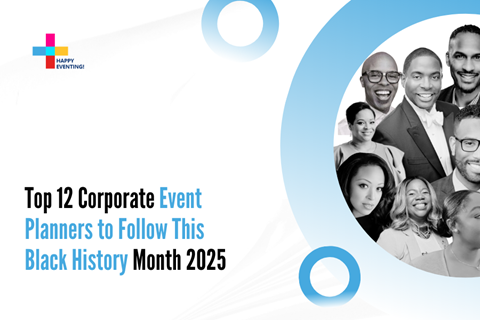

Event professionals often manage multiple stakeholders and work through tight deadlines. They face constant pressure to make their experiences nothing but flawless. Although rewarding, event planning can also lead to high stress if planners don't take steps to work on their mindset and maintain greater work-life balance. Recognizing this need, we organized a webinar that delved into the importance of mental health for event planners.
The webinar 'Balancing Event Chaos: Mental Wellness for Planners' was led by Caitlin Quarrington, a people experience leader, mental health speaker, and culture strategy and transformation expert. It covered the importance of emotional intelligence and its impact on managing stress and staying successful in the long term.

Caitlin emphasized that stress plays a significant role in influencing your productivity and greatly impacts overall well-being . According to her, strengthening oneself mentally and emotionally is key to managing stress more effectively She also stressed the importance of having a toolkit with various strategies to tackle stress. Here are the top insights from the webinar.
1. Recognize Your Emotions and Their Impact.
Emotional agility involves identifying your emotions and deciding whether they help or hinder you. Use a mood chart to evaluate whether your energy is low or high and assess how your emotions are affecting your day.
2. Use a Variety of Coping Strategies.
To stay adaptable, it’s important to have a range of tools. Quarrington suggests mixing practices like exercise, meditation, and volunteering. Gratitude reframing and journaling are powerful tools for boosting mental wellness. However, solely relying on one approach, like journaling, can limit resilience, so it’s essential to diversify your techniques.
3. Take Breaks to Recharge Your Mind.
Caitlin emphasizes the importance of right-sized breaks, even just a few minutes long, to reset emotionally. Simple actions like stepping outside, setting boundaries, or drinking water can make a big difference in refreshing your mindset.

4. Plan Your Day to Stay Focused.
Caitlin advises scheduling your activities ahead of time to avoid feeling lost or overwhelmed. Being intentional about your day helps keep you on track and reduces stress throughout.
5. Create Healthy Boundaries with Technology.
Quarrington highlights the value of limiting your digital presence to protect your mental health and improve sleep. Reducing notifications and setting clear boundaries with tech helps prevent feeling constantly overwhelmed.
A Deloitte study says that over 75% of people have experienced burnout in their current job.
Here are the major questions raised during the webinar that may give you more insights on dealing with mental stress.
Q. What are some tips for event planners to cope when they feel like too many things are going on at once?
If you practice managing your emotions every day, you can handle situations like these. An effective approach to use daily is box breathing. Another way to tackle such situations is to look at them as something that you're tackling together with your trusted co-workers as a team.
Q. What are some respectful ways to approach a colleague if their struggle with their mental health is noticeable?
The most respectful way to approach such a colleague is through a conversation. Ask them how they are doing and feeling, which shows your care and concern.
Q. How do I bounce back from a particularly stressful event without carrying that stress into the next project?
If possible, take a few days off after a stressful project. If that is not possible, focus on the learnings and the takeaways and write them down through journaling. It will also help you to think proactively.
Don't worry if you missed the webinar. We have a full recording for you. You can use it to feel positive and get inspired about making progress in your mental health journey. Taking control of your emotional well-being is crucial to surviving the chaotic world of event planning. If you want similar resources and knowledge, feel free to explore our site.

Networking is one of the most valuable ways to discover boundless opportunities and for 77.7% of business professionals , in-person conferences open a greater scope to make rewarding connections.

When planning a healthcare fair, the goal goes beyond booking a venue and sending out invites. You’re creating an event that brings together healthcare professionals, researchers, and exhibitors, all seeking value and...

Diversity and inclusion are at the heart of the events industry, where planners are focused on creating experiences that bring together people from all walks of life.